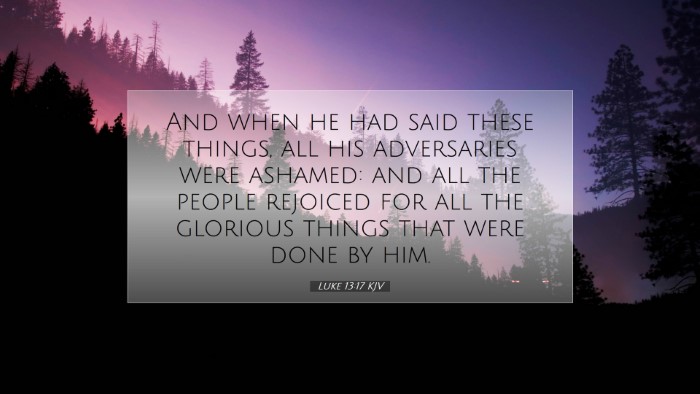Commentary on Luke 13:17
Verse Context: Luke 13:17 states, "And when he said these things, all his adversaries were ashamed; and all the people rejoiced for all the glorious things that were done by him."
Introduction
The passage in Luke 13:17 encapsulates a moment of confrontation between Jesus and the religious authorities of His time. This verse serves as a significant conclusion to a narrative where Jesus heals a woman who had been crippled for eighteen years, effectively challenging the prevailing interpretations of the Sabbath law.
Significant Themes
- Authority of Jesus: The healing signifies Jesus' divine authority and His role as a liberator.
- Conflict with Religious Leaders: It highlights the tensions between Jesus and the Pharisees, revealing their inability to recognize God's work through Him.
- The Nature of True Worship: It probes deeper into the meaning of worship and the observance of the Sabbath.
Insights from Commentators
Matthew Henry
Matthew Henry emphasizes the contrast between the adversaries of Jesus, who were ashamed, and the people who rejoiced. He notes how the miraculous act of healing was not just a display of power, but a concrete manifestation of God's mercy. Henry points out that the shame of the adversaries stemmed from their failure to see the goodness in Christ's works and their rigid adherence to tradition. The healing brings to light the hypocrisy of those who prioritize rules over human compassion.
Albert Barnes
Albert Barnes focuses on the response of the people as a crucial aspect of this scenario. He interprets their joy as a recognition of the extraordinary nature of Jesus' deeds. Barnes highlights that this joy stands in stark opposition to the shame of Jesus' adversaries, illustrating a division not only in the crowd but in the hearts of men regarding the acceptance of Christ’s ministry. Furthermore, he comments on the broader implications of this passage in relation to the Sabbath, asserting that mercy ultimately takes precedence over sacrifice.
Adam Clarke
Adam Clarke brings a nuanced view by discussing the sociocultural implications of this miracle. He explains that the act took place in a synagogue, a place where the presence of women was often marginalized. Clarke points out the significance of Jesus choosing to heal a woman, effectively elevating her and challenging societal norms. He comments on the response of the people, interpreting their rejoicing as a spontaneous outburst of joy from those who had long suffered under oppression and spiritual blindness. Clarke urges readers to see the importance of celebrating the works of God among His people.
Theological Implications
This passage offers profound insights into the character of God and the nature of Christ’s ministry. The healing on the Sabbath reinforces the concept that Jesus fulfills and transcends Mosaic Law, bringing forth a new understanding of rest and worship. The shame faced by the adversaries serves as a warning against spiritual pride and legalism, prompting contemporary readers to evaluate their attitudes towards God’s grace and the redemptive work of Christ.
Application for Pastors and Leaders
For pastors and church leaders, Luke 13:17 serves as a potent reminder of the need for balance between upholding doctrine and demonstrating compassion. This passage can challenge the church to engage in ministry that reflects God's love, especially toward the marginalized and downtrodden.
Conclusion
The conclusion of this verse reveals a critical moment in the ministry of Jesus, emphasizing His role as the great healer and compassionate Savior. The contrasting responses to His work invite all believers to consider their own attitudes towards God's work and the importance of rejoicing in the laws of love and grace that Christ embodies.


